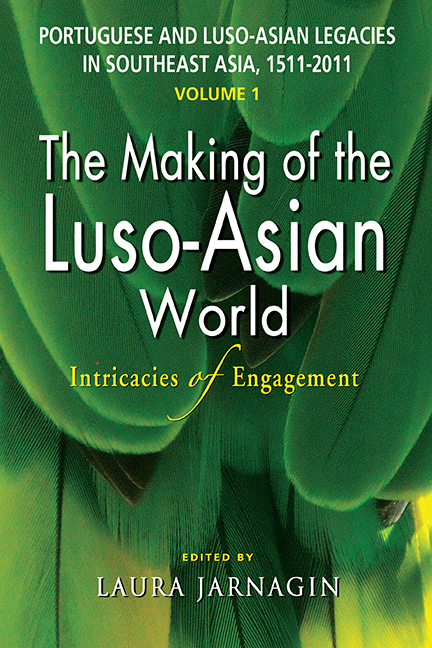 Portuguese and Luso-Asian Legacies in Southeast Asia, 1511–2011, vol. 1
Portuguese and Luso-Asian Legacies in Southeast Asia, 1511–2011, vol. 1 Book contents
- Frontmatter
- Contents
- List of Charts, Figures and Tables
- A Tribute to Glenn Ames
- Preface
- List of Contributors
- Glossary
- Introduction: Towards Clarity through Complexity
- Part One Adaptations and Transitions in the South and Southeast Asian Theatres, Sixteenth through Eighteenth Centuries
- 1 Supplying Simples for the Royal Hospital: An Indo-Portuguese Medicinal Garden in Goa (1520–1830)
- 2 Malacca in the Era of Viceroy Linhares (1629–35)
- 3 From Meliapor to Mylapore, 1662–1749: The Portuguese Presence in São Tomé between the Qutb Shāhī Conquest and Its Incorporation into British Madras
- 4 Eighteenth-Century Diplomatic Relations between Portuguese Macao and Ayutthaya: The 1721 Debt Repayment Embassy from Macao
- 5 Continuities in Bengal's Contact with the Portuguese and Its Legacy: A Community's Future Engangled with the Past
- Part Two Dispersion, Mobility and Demography from the Sixteenth into the Twenty-first Centuries
- Part Three Mixed Legacies: The Portuguese and Luso-Asians in the Twentieth and Twenty-first Centuries
- Bibliography
- Index
4 - Eighteenth-Century Diplomatic Relations between Portuguese Macao and Ayutthaya: The 1721 Debt Repayment Embassy from Macao
from Part One - Adaptations and Transitions in the South and Southeast Asian Theatres, Sixteenth through Eighteenth Centuries
Published online by Cambridge University Press: 21 October 2015
- Frontmatter
- Contents
- List of Charts, Figures and Tables
- A Tribute to Glenn Ames
- Preface
- List of Contributors
- Glossary
- Introduction: Towards Clarity through Complexity
- Part One Adaptations and Transitions in the South and Southeast Asian Theatres, Sixteenth through Eighteenth Centuries
- 1 Supplying Simples for the Royal Hospital: An Indo-Portuguese Medicinal Garden in Goa (1520–1830)
- 2 Malacca in the Era of Viceroy Linhares (1629–35)
- 3 From Meliapor to Mylapore, 1662–1749: The Portuguese Presence in São Tomé between the Qutb Shāhī Conquest and Its Incorporation into British Madras
- 4 Eighteenth-Century Diplomatic Relations between Portuguese Macao and Ayutthaya: The 1721 Debt Repayment Embassy from Macao
- 5 Continuities in Bengal's Contact with the Portuguese and Its Legacy: A Community's Future Engangled with the Past
- Part Two Dispersion, Mobility and Demography from the Sixteenth into the Twenty-first Centuries
- Part Three Mixed Legacies: The Portuguese and Luso-Asians in the Twentieth and Twenty-first Centuries
- Bibliography
- Index
Summary
One of the pre-eminent, current historiographical debates in Thai history concerns the nature of the “National Revolution” of 1688 and whether it genuinely ushered in a period of xenophobia and retreat from international engagement, with Siam becoming a “hermit kingdom” in the language of the academic literature. Traditionally, historians like Hutchinson have insisted that the country became moved by “a spirit of blind and arrogant self-sufficiency”. Revisionist historians like Anthony Reid would like to suggest that this was not necessarily the case, since relations between Siam and China were strengthened in this period, and that Phetracha (ruled 1688–1703) was not personally motivated by xenophobia but used it to motivate political support.
The European population remaining in Ayutthaya nevertheless suffered considerable hardships when we compare their situation to earlier times. Fernao Mendes Pinto created an enduring myth of the “good king” (bom rei) of Siam, which we can accommodate to the long reign of Narai (ruled 1656–88). Under Phetracha, on the other hand, some of the leading European families were enslaved, and — to quote from a Portuguese document produced shortly after the climactic events — “the college of the Bishop has been turned into a pagoda and the Christians among the local population under the bishop were seized, the King forcing them to apostize.” Of the European trading companies, only the Dutch factory managed to limp on, the French colonial entrepreneur Pierre Poivre reporting in 1745 that “today, the Dutch are the only Europeans who go to trade in Siam”, sending three regular ships from Batavia per annum, plus one East Indiaman that stopped in Siam on its way to Japan. In 1715, the once burgeoning company trade in deerskins came to an abrupt end, as it was decided that the two East Indiamen allowed annually to Deshima would be more profitably laden with other goods taken on board in Batavia. Final closure of the logie (the Dutch trading factory), however, came only in 1765.
Thai historiography traditionally does not really accept, or even engage, with the debate about xenophobia and long-term retreat and presents circumstances in Siam at the time as peaceable and stable in this period. King Taisra (1709–33) is seen to have enjoyed a peaceful, twenty-four-year reign, punctuated only by an “intervention in the internal affairs of Cambodia in 1717 in order to maintain overlordship”.
- Type
- Chapter
- Information
- Portuguese and Luso-Asian Legacies in Southeast Asia, 1511–2011, vol. 1The Making of the Luso-Asian World: Intricacies of Engagement, pp. 83 - 105Publisher: ISEAS–Yusof Ishak InstitutePrint publication year: 2011


